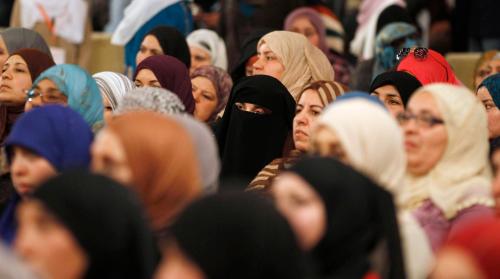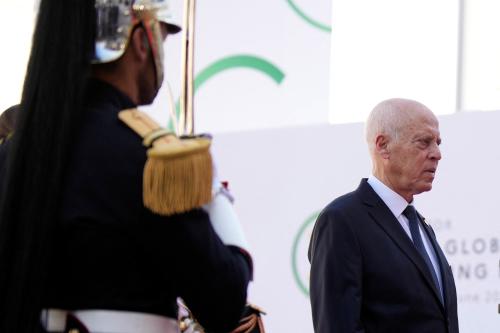In 1846, Tunisia became both the first Arab and the first Muslim country to abolish slavery. Now, it has become one of the first to criminalize racism.
On October 9, Tunisia’s parliament passed the “Elimination of All Forms of Racial Discrimination” Act. The law, which defines and criminalizes racial discrimination, is an important step forward in defending the rights of the 10 to 15 percent of Tunisians who identify as black, as well as the country’s 60,000 sub-Saharan African immigrants.
The law originated in 2016 from the case of Sabrina, a black Tunisian who had been verbally abused on Habib Bourguiba Avenue in downtown Tunis. When attempting to report the crime, the police station turned her away due to “the lack of a specific law” against racism. Later, on December 25, 2016, three Congolese students were stabbed in a train station in Tunis. Amid demonstrations by civil society organizations, Prime Minister Youssef Chahed expressed his support for the law the next day.
These assaults on black Tunisians and migrants are not isolated incidents. The Al-Jazeera documentary “Tunisia’s Dirty Secret” details the racism many Tunisians face on a daily basis. Part of the film follows Hamza, who wore a hidden camera in his glasses. “Slave, have you been kicked out from your house?” one passerby sneers. “Have a shower you lazy bastard.” Some towns in the south of Tunisia, such as Sidi Makhlouf in Medenine, even have separate school buses for black children. Black Tunisians are also woefully under-represented in the public sphere. There is only one black member of parliament (Ennahdha’s Jamila Debbech Ksiksi) and the first black newsreader on state-run TV only appeared this year.
In part because the state has never recognized race, there are no official statistics on the number of black Tunisians, their socio-economic status, or the extent of racial discrimination. However, new survey data provide initial answers to these questions. In this year’s Afrobarometer, a nationally representative survey conducted in April-May 2018, the survey team for the first time recorded their respondents’ race, classifying 92 of 1199 respondents (about 8 percent) as black.
These survey data suggest that black Tunisians are socio-economically worse-off than other Tunisians (see Table 1). They are about 10 percentage points more likely than other Tunisians to live in rural areas, and are 15 percentage points less likely to own a radio, car, or computer. In terms of education, they are about 10 percent less likely to have completed primary school. Most strikingly, black Tunisians are almost twice as likely to be unemployed (42 percent) than other Tunisians (25 percent).
Table 1: Afrobarometer Survey (2018) Results by Race
| Black Tunisians (%) | Other Tunisians (%) | |
| Rural | 39 | 31 |
| Own a Radio | 51 | 66 |
| Own a Car | 46 | 61 |
| Own a Computer | 38 | 50 |
| Completed Primary School | 52 | 62 |
| Unemployed | 42 | 25 |
The survey also uncovers potential evidence of differential treatment by state authorities. The Afrobarometer asked respondents: “When dealing with public officials, how much do you feel that they treat you with respect?” Black Tunisians were significantly less likely than other Tunisians to report “a lot of respect” (20 versus 31 percent), and more likely to report “no respect at all” (17 versus 11 percent), even when taking into account their lower socio-economic status.
Perhaps as a result of this treatment, black Tunisians in the survey appeared to avoid state authorities. They were less likely than other Tunisians to report approaching the state in the last year for official documents (21 versus 37 percent) or for social services (3 versus 15 percent), even when controlling for their socio-economic status.
The new anti-racism law, which passed by an almost unanimous vote in parliament, is intended to address this socio-economic and political discrimination of black Tunisians and migrants. The law prescribes one to three months in prison for racist language, and one to three years for inciting hatred, disseminating ideas about racial superiority, or supporting a racist organization or activity. The law also commits the state to undertake awareness and training campaigns, and creates a National Instance against Racial Discrimination to present an annual report to the parliament.
Its most important effect, however, may be to officially recognize that racism exists in Tunisia. To this day, denial permeates even the highest levels of government. Ahead of the vote, Member of Parliament Faycel Tebini asserted that “there is no racial discrimination in Tunisia” and called for the parliament “not to sow resentment and conflict in society.” The minister in charge of relations with the parliament aptly responded that “the importance of the bill…is to put an end to the denial of this crime.” By recognizing racism, the law—as the president of the Tunisian Forum for Economic and Social Rights put it—“is a turning point in Tunisia, as important as the decree abolishing slavery.”
On this issue, as with many others, Tunisia should serve as a model for the region. The Gulf, Egypt, Libya, and other Arab countries would do well to address discrimination of their racial minorities as well.
The Brookings Institution is committed to quality, independence, and impact.
We are supported by a diverse array of funders. In line with our values and policies, each Brookings publication represents the sole views of its author(s).







Commentary
In another first, Tunisia criminalizes racism
October 15, 2018